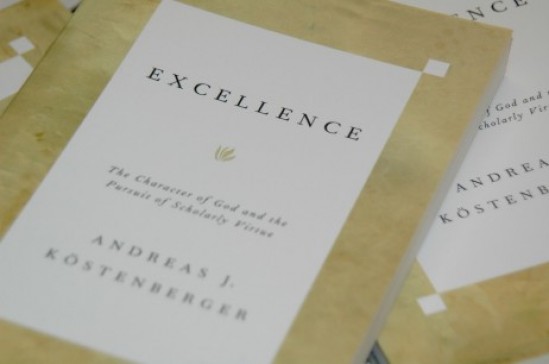A good many books have arrived on bookshelves which broadly address the Christian intellect. Surely the grandfather of them all is Harry Blamaires’ The Christian Mind (1963). Others followed, all adding to the essential discussion, pleading with Evangelicals to honor God’s gift of intellectual pursuit left with humanity. A biblical-theological case established in each tome structured direction in overview fashion that The Church bore responsibility for Christian thinking. Andreas J. Köstenberger now adds personal depth to the entire dialogue. Excellence maintains that a believing scholar’s intellectual pursuits must always originate from Jesus’ transformation of the Christian which changes the mind.
The principles and commands of Scripture run throughout life and so, should run through the Christian scholar. My copy of Excellence is pock-marked with exclamation points, cheers, and penciled shouts of glee. Always, always, always must the believer premise examination and explanation of anything on the exegesis of The Book. It has been some time since I have seen a volume so full of argument sustained with an avalanche of biblical texts! Answering the question “Where is that found in The Bible?” is answered again and again evidenced by deep exegetical study. Word studies abound. Correlation passages pound the truth that Scripture is Its own best interpreter. Hebrew and Greek understanding is brought to bear on seemingly every item in Köstenberger’s passionate exploration. As a good scholar should do, Köstenberger builds his case on the foundation of biblical theology. Copious, intricate endnotes cast a wide net, gathering sources, evidence, and added application. At times, the footnotes expand understanding to such a degree they seem to supersede the text itself!
The opening chapters give credence to theological truth about a scholar’s pursuit of excellence. This is no esoteric manuscript! For example, as Köstenberger begins to make his case, he carefully and clearly transitions the biblical concepts to educational practice. He rightly links arête and telos to affective goals in education (43-46). In keeping with his goal, Köstenberger argues, as he should, that our doing arises out of our being. Applicational statements pop off each page. Excellence is prompted by virtue which should prompt intentionality connected to community ultimately culminating in gratitude (48-53). What should be obvious to any Christian scholar who claims The Name is specifically spelled out for all to see.
Köstenberger then examines what should be the essential basis for all of life for the believer—holiness (55-66). Ultimately Excellence is the fruit of distinctiveness coming from the root of holiness. What joy to discover an author who properly links the human corruption of worship in idolatry to its roots in The First Testament! Distinctiveness in Christian scholarship from other viewpoints is the obvious application when worship of other presuppositions is properly exposed. Christian scholarship emphasizes an apologetic of love born of holiness (81). Each chapter echoes the essence of holiness: diligence, courage, passion, restraint, creativity, eloquence.
Köstenberger’s charge to theological thinkers begins and ends with himself. Over and over, the author demonstrates that his personal compulsion to practice his scholarly craft rests on application of truth to life. Grand additions to Excellence are the questions the author includes within every section. Christian scholars are expected to personally reflect on their response to Köstenberger’s applicational concerns. Examples of scholars who have moved away from a presuppositional approach to Christian scholarship as well as those who continue the pursuit of distinctive biblical engagement are found throughout the volume. Köstenberger deals with PhD work, plagiarism, workaholism, distractions, or peer pressure brought on by cultural pressures scholars face. Of course, Excellence is ultimately a commitment born of a covenant loyalty which has changed us.
From time to time disconnects occur. The biblical principle of ‘rest’ rightly applied to the scholar seems not to flow with other ideas which are assumed to emanate from it (38-39). Sexual temptation is proffered as a problem for the Christian scholar but the connection to excellence in scholarship is not obvious (57-59). One wonders in later chapters why the exegetical word studies give way to examples of believers from Scripture. What was begun in the first sections of Excellence is not carried through to the end: the section on ‘wisdom’ could have been easily supported from Hebrew vocabulary (177ff). Sometimes Köstenberger too easily dismisses other points of view. Monastic traditions, for instance, are not given full coverage to color them as simply “ascetic spirituality” (76). Small quibbles arise when the reader has to endure repetitious statements such as “I will have more to say about this in a later chapter” (i.e. 59). Transitional elements should trump such pedestrian linkage. But these minor shortcomings do not mar Köstenberger’s pristine work.
For years, a self-made poster hung in my classroom: “not just information but transformation.” My admonitions to young charges to “think, biblically” resounded through educational hallways. Köstenberger may have had just such written spoken admonitions for his own students. He has set a standard for other scholars to follow. My responsibility in the study is to dig deep, push wide, and explain my findings simply in the classroom. So here, Köstenberger gives evidence of his exegetical work buttressed by his analysis with real world examples. Christian scholars could have their own excellence expanded by reading Excellence.
Excellence: The Character of God and the Pursuit of Scholarly Virtue by Andreas J. Köstenberger. (Crossway, 2011). 270 pp. $17.99. Reviewed by Mark Eckel, Professor of Old Testament, Dean Undergraduate Studies, Crossroads Bible College, Indianapolis. To be published at www.gospelcoalition.org.

